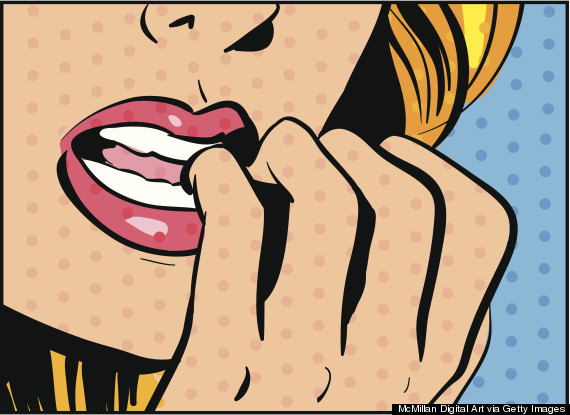
"She's just really... Type A."
We use it in conversation all the time, generally followed by a knowing chuckle or nod of the head. "Type A" has become a pop psychology buzzword and catch-all descriptor for the more driven, anxiety-prone go-getters among us. We all have some sense of what it suggests, but the actual meaning and legitimacy of Type A Behavior theory are less well-known.
Coined in the late 1950s, the term "Type A" originated when cardiologist Meyer Friedman observed a relationship between incidences of heart disease and personality type -- namely, that those most likely to suffer a cardiac event also tended to have, in his estimation, more driven, impatient, high-stress personalities. Though Friedman first proposed Type A theory in his writings in various academic journals in the '50s, the theory become popularized when his book with Dr. Ray H. Rosenman, Type A Behavior And Your Heart, was published in 1974 and soon afterwards become a bestseller. Since then, "Type A Behavior" (TAB) has become psychology parlance for a loose set of tendencies related to highly competitive people.
Today, the term might seem like a relic of classical psychology, but it is still accepted as a valid personality theory, with some caveats. We should think of Type A as a spectrum of behaviors and traits rather than a label or distinction from a "Type B" personality, explains John Schaubroeck, professor of psychology and management at Michigan State University.
"Type A is a shorthand way of referring to a predisposition that people have," Schaubroeck tells the Huffington Post. "It's not like there are 'Type A's' and then there are 'Type B's,' but there is a continuum that as you're more on the Type A side of the spectrum, you're more driven, and tend to be impatient and competitive and get irritated easily by impediments to your progress on things."
While the overarching classification of Type A personalities may be a bit of an oversimplification, the spectrum can still be a helpful psychological tool to help you identify your own strengths and weaknesses. Here are 16 signs that you're a little (or a lot) Type A.
Waiting in long lines kills you a little bit inside.

Type A's are deeply irked by anything that slows their progress or needlessly keeps them from getting things done -- and when it comes to halting your momentum, there are few things worse than long, slow-moving lines.
"[Type A's] are people who want to get a lot of things done and get irritated if their goals or their progress toward their goals is blocked," explains Schaubroeck.
You've been described as a perfectionist, overachiever, workaholic or all of the above.
Type A behavior tends to go hand in hand with perfectionism and workaholism -- characteristics that are closely tied together and generally driven by a goal-oriented mindset and intense drive to succeed.
You bite your nails or grind your teeth.

Type A's are more prone to nervous behaviors like nail biting, teeth grinding and fidgeting. This symptom of Type A behavior goes back to Friedman's early research. While working with his patients who had heart disease, Friedman noticed that many of them had a habit of grinding their nails into a chair in his office (deep enough to leave marks), which he took to indicate a heightened state of agitation, Schaubroeck explains.
You have a serious phobia of wasting time.

Stuck in traffic? Trapped in a waiting room at the doctor's office? With your natural impatience and distaste for time wasted, you tend to get frustrated by waiting in line. Few things elevate your blood pressure and get on your nerves like time being wasted, either by you or by others.
"The term we use is 'time urgency,'" says Schaubroeck. "There's never enough time to do what you want to do."
You're highly conscientious.
You may get stressed and anxious more often than others, but it's because you really care. In all areas of your life, it's important to you to stay on top of things and make sure it all gets done. As such, you're usually the one who remembers everyone's birthday, makes sure the cupcakes and flowers are ordered ahead of time, and makes sure everyone is having a good time at the party.
You've always been a bit of a catastrophist.

But a lot of the time, you don't feel fine -- you can't help but worry about the future and dwell on the worst possible outcome of any problem or failure.
You frequently talk over and interrupt people.

Not on purpose, of course -- you mean well and you do care about what people have to say. But you still find yourself cutting off your friends and acquaintances in order to make your points and advance the conversation.
You have a hard time falling asleep at night.

Type A's tend to dwell on frustrations and worries, and it can keep them up at night. If you have Type A tendencies, there's a good chance that a troubling event or conversation makes your brain go into overdrive when your head hits the pillow.
People can't keep up with you -- in conversation or on the sidewalk.
Type A individuals are defined by their drive and competitiveness, says Schaubroeck. They like being on the go, and they love getting things done. The result? More often than not, they're in a rush.
You put more energy into your career than your relationships.
As a Type A, your natural tendency is to focus on measurable achievements like grades or promotions. So while your relationships are extremely important to you, it's easy to slip into a single-minded focus on work or school -- at the expense of the rest of your life.
Relaxing can be hard work for you.

For deadline-driven, goal-oriented Type A's, taking time off to relax can feel unnatural -- time is money, after all. To really get into vacation mode, you may have to look at relaxation itself as a goal. Then you're all in.
You have a low tolerance for incompetence.

Traditionally, Type A's were described as angry and hostile, but psychologists have contested whether a predisposition to hostility is really part of the equation, according to Schaubroeck. But it is agreed that Type A's are driven and goal-oriented above all else, which means they can be less accepting than others when it comes to anything that gets in their way -- or any person who doesn't have the same sense of urgency.
You'd be lost without your to-do list.
Type A's thrive with a goal and a plan of action, Schaubroeck explains. For that reason, to-do lists are one your best friends: You love seeing all your tasks plotted out and thrive on the rush of checking off a finished item.
At work, everything is urgent.
For Type As, especially in the workplace, everything has to be done yesterday. There's a sense of time urgency that goes along with your impatience and need for deadlines.
"Type A's are sensitive to time and the quickest way to get on their nerves is to take your time," advised a Psychology Today article on working with Type A personalities. "If you want to get on their good side, work at the same speed as they do."
You're sensitive to stress.
Friedman's pioneering research defined Type A Behavior as fundamentally high-stress. You may experience stress more intensely than others seem to, and either internalize or externalize it in response. These type of stress-prone personalities and behaviors have been linked with high blood pressure and increased risk of heart disease.
You make it happen.

Despite (or in some cases because of) the more negative qualities associated with being Type A, people with this personality type tend to be very good at accomplishing their goals. Many managers want Type A employees because they know that they can be trusted to get things done, according to Schaubroeck.
"[Type A's] are certainly more occupied with achieving outcomes," says Schaubroeck. "And given that they're so occupied with achieving their goals, it makes sense that they would be more likely to do so."
Does this all sound a little too familiar? If you have Type A tendencies and could use a bit more Zen in your life, try these 20 scientifically backed ways to de-stress right now or try these digital meditation tools to help you start a calming, focus-boosting mindfulness practice.
Arianna Huffington and Mika Brzezinski are taking The Third Metric on a 3-city tour: NY, DC & LA. Tickets are on sale now at thirdmetric.com.